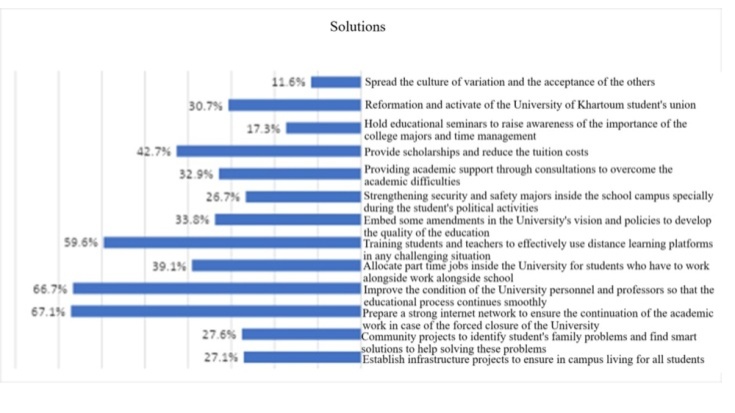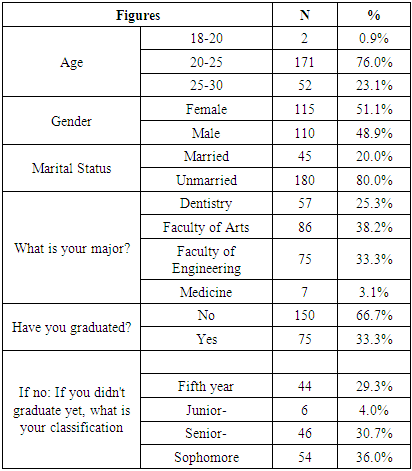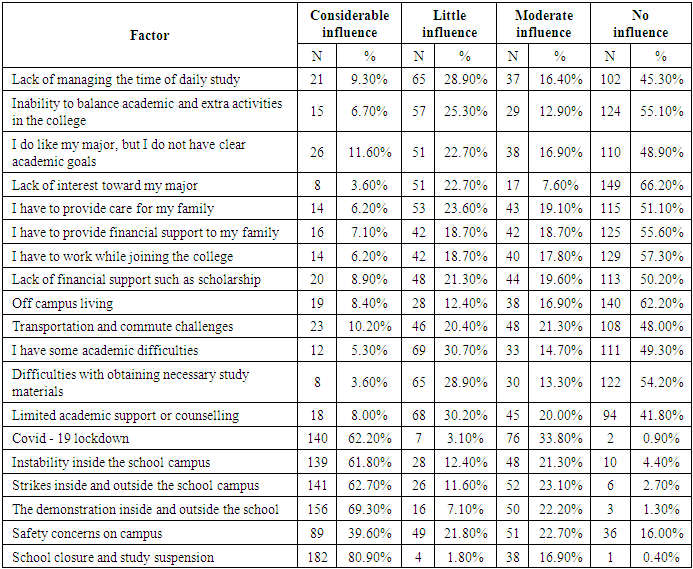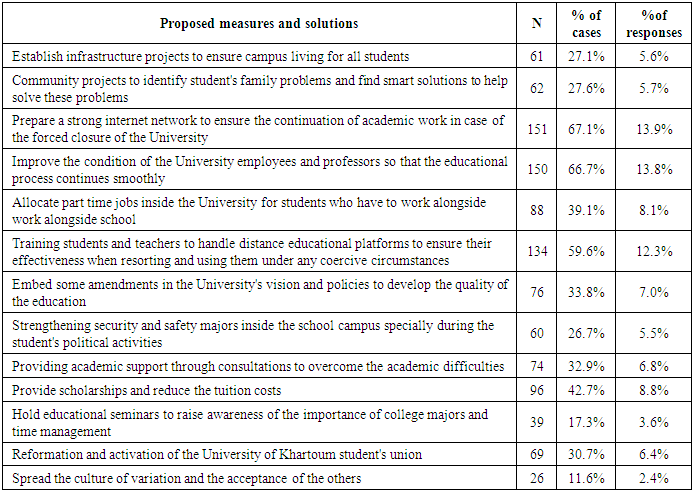-
Paper Information
- Paper Submission
-
Journal Information
- About This Journal
- Editorial Board
- Current Issue
- Archive
- Author Guidelines
- Contact Us
Education
p-ISSN: 2162-9463 e-ISSN: 2162-8467
2025; 15(1): 6-13
doi:10.5923/j.edu.20251501.02
Received: Mar. 4, 2025; Accepted: Apr. 3, 2025; Published: Apr. 19, 2025

Factors Influencing the Graduation Time Among Undergraduates at University of Khartoum
Esraa Ahmed Elttayib Ali
College of Education, Hebei University, Baoding, China
Correspondence to: Esraa Ahmed Elttayib Ali, College of Education, Hebei University, Baoding, China.
| Email: |  |
Copyright © 2025 The Author(s). Published by Scientific & Academic Publishing.
This work is licensed under the Creative Commons Attribution International License (CC BY).
http://creativecommons.org/licenses/by/4.0/

Graduation time is a crucial factor that determines the success of any educational program. Considering the current situation in Sudan, students are facing graduation delay issues. This study aims to shed the light on the most influencing factors of the graduation time among the undergraduate students at the Capitals biggest and oldest university, which is the University of Khartoum represented in four colleges: Quantitative research utilizing a Likert scale questionnaire was employed to examine the extent to which individual, socioeconomic, institutional internal and external factors influenced graduation time. Descriptive statistics and exploratory factor analysis were used to analyse the collected data. The findings indicate that school closures and study suspensions necessitate by actor undergraduate student’s graduation at the University of Khartoum. Based on the students' experiences, the study recommends that the university enhance its internet and technological infrastructure and provide support and training for faculty and staff in distance education these measures are essential to ensure the continuation of academic work, especially during periods of forced school closures and to optimize the overall educational experience.
Keywords: Graduation time, University of Khartoum, Undergraduate students
Cite this paper: Esraa Ahmed Elttayib Ali, Factors Influencing the Graduation Time Among Undergraduates at University of Khartoum, Education, Vol. 15 No. 1, 2025, pp. 6-13. doi: 10.5923/j.edu.20251501.02.
Article Outline
1. Introduction
- Graduation delay is a phenomenon where students take longer than the expected time to complete their degree, is a prevalent issue in higher education systems worldwide. Studies have shown that this issue affects countries such as the United States, Germany, France, Denmark, and Sweden [1]. Graduation delays not only disrupt individual students' future plans and career prospects but also have significant institutional consequences. For universities, prolonged student enrollment strains resources, limits opportunities for new students, and undermines the overall quality of academic programs. Addressing this issue requires identifying and implementing strategies to expedite the graduation process and reduce delays.Factors contributing to delayed graduation vary across different countries and institutions [2], [3]. In the context of the University of Khartoum, understanding the specific factors that impact students' graduation time is critical. While previous studies have focused on academic factors such as students' GPA (Grade Point Average) and their effect on graduation time, there is a lack of research on institutional and individual factors, particularly in the unique context of Sudan. The current situation in Sudan, especially in Khartoum State, has introduced additional challenges, such as safety concerns, campus unrest, and study suspensions, which may significantly influence students' ability to graduate on time. This study aims to identify the most influential factors contributing to delayed graduation among undergraduate students at the University of Khartoum. Specifically, it focuses on institutional factors (e.g., study suspensions, campus unrest) and individual factors (e.g., family support, financial constraints, logistical challenges, and academic performance). To achieve this, the study employs a quantitative approach, using a structured questionnaire to collect data from undergraduate students. By examining these factors, this research seeks to fill a critical gap in literature and provide insights that can help universities develop targeted interventions to reduce graduation delays.
2. Literature Review
- A consensus exists in the literature regarding the definition of graduation delay. Several studies, define graduation delay as a phenomenon where students take longer than the expected time to complete their degree programs [4]. In other words, it refers to the inability of higher education students to accomplish their degrees within the standard timeframe. Graduation delays can be categorized into two types: delayed graduation and dropout. Delayed graduation occurs when students extend their time in a program beyond the expected duration, while dropout refers to students who leave the program before completion. Furthermore, graduation delays can be classified as either voluntary or involuntary. This paper focuses on involuntary graduation delays by examining the most influential factors affecting the graduation time of undergraduate students at the University of Khartoum.Graduation delays have significant consequences for institutions, society, and individuals. Institutional effectiveness is often measured by graduation rates, which serve as a key indicator of success [5]. Universities that prioritize improving graduation rates typically implement policies, allocate resources, and establish support systems such as academic advising programs, tutoring services, and career development resources to enhance student success and timely degree completion. However, graduation delays create a bottleneck effect, as universities accumulate students who take longer to graduate Thereby reducing the available capacity for new admissions and limiting enrollment opportunities.Socioeconomically, graduation delays impact resource allocation, educational outcomes, and labor market dynamics. For instance, Chalaris et al. 2015 [4] highlights that legislation in Greek higher education institutions (HEIs) mandates the exclusion of students who "linger" too long in their programs, directly affecting their future prospects. Individually, delayed graduation can lead to over-education, resulting in wage penalties for graduates, Aina and Pastor, 2020 [3] found that per annum of graduation delay decreases employment probability by 0.8% and leads to lower net monthly incomes. These findings underscore the multifaceted impact of graduation delays on higher education effectiveness, socioeconomic systems, and individual career trajectories.Previous studies have identified a range of factors contributing to graduation delays, categorizing them into institutional, economic, social, and individual factors. These factors vary across contexts and institutions, highlighting the complexity of the issue.Individual factors play a noteworthy role in graduation delays Academic challenges, low grades and poor admission process, low academic performance in the programs [6] in addition, pre-University background such as the quality of secondary education [7]. unclear academic goals and poor time management skills, are key contributors [8]. Jumadi 2020 [9] found a negative correlation between academic procrastination and effective time management, suggesting that students with better time management skills are less likely to procrastinate and more likely to graduate on time. less Self-discipline, self -control, self-efficacy and less motivation named as graduation obstacles which may lead to graduation delay among the higher education students as in [10]. Personal responsibilities, such as family caregiving, can also limit study time and contribute to delays [11]. Additionally, family dynamics significantly influence academic performance. as in Sidhu [12] mentioned that older age students or those who have family responsibilities and financial instability they often have to work part-time face timely graduation conflicts and majority of this figure prolong the graduation time. While Jumadi et al 2020 [13] highlights the positive impact of strong family support, the study identifies challenges such as uneducated parents, large family sizes, and strained family relationships as hindrances to timely graduation. Additionally, excessive parental pressure has also been linked to academic failure [14].Financial stress is another critical individual factor. [15] and [16] notes that financial constraints and work commitments often force students to work while studying, diverting time and energy from academic pursuits and delaying graduation. Academic factors, such as changing majors, lack of prerequisite courses, and limited course availability, further exacerbate delays [17]. Poor academic performance, which may necessitate retaking courses or reevaluating career paths, also extends graduation timelines.Institutional factors can be divided into internal and external factors. Internal factors include inadequate course offerings, complex degree requirements, and high GPA requirements, all of which contribute to graduation delays [9]. Mismatches between the program requirements and the student’s preparedness also exacerbate graduation delay as study results Letkiewicz et al., 2014 [18] emphasizes that teaching quality and research opportunities also influence graduation timelines. Additionally, campus instability and unrest directly disrupt academic processes, as highlighted by Tinto [19], who state that unstable campus environments negatively affect student progress and graduation timelines.External factors, such as pandemics and socio-political unrest, have significantly disrupted academic schedules worldwide, leading to widespread graduation delays Mohammed et al 2023 [20] highlights that social tensions, demonstrations, and strikes create unstable learning environments, hindering academic progress and resulting in delayed graduations [21] and [22]. For instance, Zunes [23] document the impact of prolonged social upheavals, such as the eight-month-long demonstrations and strikes in Khartoum during 2018–2019, on academic year work flow and campus stability.Despite the extensive research on graduation delays, many institutions focus primarily on tracking graduation rates rather than investigating the underlying causes of individual delays. Moreover, while previous studies have examined academic and individual factors, there is a lack of research on institutional factors, particularly in the context of the University of Khartoum. The study aims to address this gap by identifying and evaluating the factors influencing graduation time, with a specific focus on the impact of institutional and external factors, such as campus unrest and socio-political instability, on undergraduate students’ academic progress.
3. Methods and Data Collection
- This study employed a quantitative research design to identify and analyze the key factors influencing undergraduate students' graduation time at the University of Khartoum. The quantitative approach was chosen to systematically measure and statistically analyze the relationships between various factors and graduation delays. Descriptive statistics and exploratory factor analysis (EFA) were used to analyze the data, with the latter helping to identify underlying patterns and relationships among the factors.
3.1. Data Collection
- Data were collected using an online questionnaire developed through Google Forms. The questionnaire was distributed to undergraduate students from four colleges at the University of Khartoum, covering the academic years from 2015 to 2019. A total of 350 students were targeted to participate, and 225responses were received, yielding a response rate of 64.3%. The sampling method employed was random sampling to ensure representation across colleges and academic years from 2015 to 2019 college batches. Participants were provided with clear instructions about the study’s purpose, the voluntary nature of their participation, and the measures taken to ensure the confidentiality of their personal data. These measures included anonymize responses and storing data securely. The questionnaire consisted of 27 questions divided into 3 parts (sample characteristics, factors influencing on the graduation time and proposed measures and solutions) and the response percentage for each question was calculated to assess completion rates and identify any potential biases in the data.
4. Results and Discussion
- The findings are detailed in three sections according to the research aims. The first gives participant’s demographics. The second ranks factors affecting graduation time as experienced by participants. The third shows students’ proposals for reducing these factors’ impacts.
4.1. Scale Reliability
|
4.2. Results
|
|
4.2.1. Institutional Factors
- School Closure and Study Suspension: A significant 80.9% of students indicated that interruptions due to school closures and suspensions heavily influence their graduation timeline. These interruptions can lead to a halt in academic progress, delaying the completion of courses and requirements.Demonstrations inside and outside the campus; (69.3%) and strikes (62.7%) create a volatile environment that disrupts regular academic activities, leading to delays in coursework and examinations.Instability Inside the School Campus: 61.8% of students reported that instability within the campus, such as administrative issues or conflicts, negatively affects their academic journey, causing delays.COVID-19 Lockdown The pandemic lockdown affected 62.2% of students considerably, disrupting both academic and personal lives and extending the time required to graduate.
4.2.2. Safety and Support Issues
- Campus Safety: 39.6% of students mentioned that safety concerns on campus hinder their ability to attend classes regularly and focus on their studies, contributing to delays in graduation.Limited Academic Support or Counseling: 8.0% of respondents indicated that insufficient academic support or counseling services can exacerbate academic difficulties, leading to extended graduation timelines.
4.2.3. Logistical Challenges
- Transportation and Commute Challenges: 10.2% of students cited transportation and commuting difficulties as significant barriers to timely graduation, as these issues can lead to irregular attendance and missed classes.Off-Campus Living, as 8.4% of students living off-campus face additional challenges in managing their time and resources effectively, which can impede their academic progress.
4.2.4. Financial and Personal Responsibilities
- Providing Financial Support to Family: 7.1% of students need to financially support their families, which divides their time and focus between work and study, leading to delays.6.2% of students work while studying, which can detract from the time and energy they can dedicate to their academic responsibilities. Providing Care for Family: 6.2% of students also mentioned the need to provide care for their families as a significant factor that affects their ability to graduate on time.
4.2.5. Academic and Personal Factors
- 11.6% of students indicated that not having clear academic goals contributes to delays in graduation, as they may lack direction and motivation.Inability to Balance Academic and Extracurricular Activities 6.7% of students struggle to manage their academic workload alongside extracurricular activities, leading to extended time in college.Lack of Managing Daily Study Time 9.3% of students reported difficulties in managing their daily study time effectively, which can delay their academic progress and graduation. Lack of Interest in Major: 3.6% of students cited a lack of interest in their major as a factor contributing to delayed graduation, as they may lack motivation to complete their studies. These factors represent the influencing factors on the graduation time of the undergraduate students at the university of Khartoum during the study time classified into five main categories.
|
 | Figure 1. Suggested Solutions to Reduce the Graduation Delay Issue |
4.3. Discussion
- An initial objective of this study was to identify the most influential factors on the graduation time of undergraduate students at the university of Khartoum. The study conducted a questionnaire to identify these factors and rank them according to their influence on graduation time.The graduation time of undergraduate students at the University of Khartoum is significantly influenced by a range of institutional, personal, logistical, financial, and academic factors. Understanding these factors is crucial for developing effective interventions to support students in completing their degrees on time.The results indicates that Institutional disruptions, such as school closures, demonstrations, and strikes, are among the most significant contributors to delayed graduation. The data revealed that 80.9% of students cited school closure and.The study also shows that the academic year interruption is a major influence, while demonstrations (69.3%) and strikes as (62.7%) responded were also influential factors in delaying the graduation time. These set of factors are the main criterion for Khartoum University due to the ongoing political unrest in the city. Since the university is situated in the Khartoum city center, it is particularly affected by disturbances in the area, such as demonstrations and vigils., etc. These findings align with previous studies conducted by Mohammed [20] who indicating that political instability and institutional disruptions can severely impact students' academic progress, Ensuring a stable and uninterrupted academic calendar is critical for timely graduation. Besides that the safety concerns on campus, as reported by 39.6% of students reflects the broader issue of campus safety in regions with political unrest and instability. Less percentage given for limited academic support or counseling, noted by 8.0% of students, further exacerbates the problem. According to Tinto’s 2012 theory of student retention, supportive academic environments are crucial for student success. Universities should enhance counseling services and provide a safe and secure learning environment to mitigate these issues. Logistical challenges such as transportation and commuting difficulties (10.2%) and off-campus living (8.4%), also contribute to delayed graduation. These challenges align with the study by Kuh et al [25], who found that students living off-campus or with lengthy commutes often face difficulties in maintaining regular attendance and engagement. Universities could address these issues by improving on-campus housing options and transportation services.Financial burdens and personal responsibilities significantly impact students' academic timelines. The need to provide financial support to families (7.1%) and work while attending college (6.2%) were notable factors. These findings are supported by previous research indicating that financial stress can negatively affect academic performance and prolong graduation timelines by Witteveen and Attewell [15]. Providing scholarships, reducing tuition costs, and offering part-time jobs within the university can alleviate these financial pressures.Academic challenges, such as lack of clear academic goals (11.6%), inability to balance academic and extracurricular activities (6.7%), and poor time management (9.3%), were also highlighted. These issues are consistent with the findings of Conley [6] who emphasized the importance of goal setting and time management skills for academic success. Interventions such as academic counseling, time management workshops, and goal-setting seminars can help students overcome these challenges.
5. Limitations
- One limitation of this study is that the sample was drawn solely from the University of Khartoum for specific period of time and specific batches of undergraduate students. While it provides valuable insights into this specific institution, but it may not fully represent the experiences of students across all Universities in Khartoum State, which may vary in size and graduation timelines. Future research could explore the impact of these factors on a broader range of higher education students, including those in master’s and Ph.D. programs. Additionally, future studies could investigate the current issue of student dropout rates at the University of Khartoum and other Universities all over Khartoum state and all over Sudan affected states after the war outbreak in April 2023. Another area for further research is to assess the effectiveness of distance learning in higher education and the dropout of higher education students in Sudan, during the period of Sudan’s 2023 war.
6. Conclusions
- This study identified the most influential factors on the graduation time of undergraduate students at the University of Khartoum, focusing on four colleges. The most significant factors were institutional disruption including school closures and study suspension, which were largely the result of political and social unrest in Khartoum State, compounded by the COVID-19 pandemic. As indicated by 80.9% of participants, these disruptions had a considerable impact on their graduation time. to address these challenges, students the study suggested several key improvements, including enhancing the internet and technological infrastructure, supporting university employees and professors, and providing financial and job support for students. By implementing these strategies, the University of Khartoum can create a more supportive and effective learning environment, reduce delays in graduation, and improve student outcomes. Improving the working conditions for faculty and staff can ensure that the educational process continues smoothly.
 Abstract
Abstract Reference
Reference Full-Text PDF
Full-Text PDF Full-text HTML
Full-text HTML


